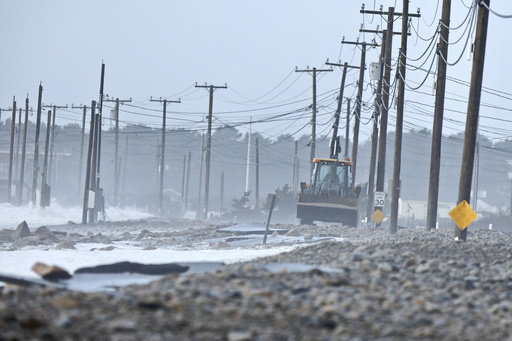BOSTON (AP) — A Massachusetts beach community is scrambling after a weekend storm washed away $600,000 in sand that was trucked in to protect homes, roads and other infrastructure.
The project, which brought 14,000 tons (12,701 metric tons) of sand into Salisbury over several weeks, was completed just three days before Sunday’s storm clobbered southern New England with strong winds, heavy rainfall and coastal flooding.
The Salisbury Beach Citizens for Change group, which facilitated the project and helped raise funds, posted on social media about the project’s completion last week and then again after the storm. They argued that the project still was worthwhile, noting that “the sacrificial dunes did their job” and protected some properties from being “eaten up” by the storm.
Tom Saab, president of the group and a real estate broker/developer, said the money was contributed by 150 property owners who said the state has refused to help them protect the beachfront and build up the dunes.
“The state will not contribute any money to the rebuilding of dunes. That is the bottom line,” Saab said. “Everybody is angry and upset. We can’t survive without sand rebuilding the dunes and can’t survive paying out of our pocket after every storm.”
Last weekend’s tempest was the latest of several recent severe storms in the community and across Massachusetts, which also suffered flooding, erosion and infrastructure damage in January.
Sand replenishment has been the government’s go-to method of shore protection for decades. Congress has long appropriated money for such work, arguing it effectively protects lives and property and sustains the tourism industry.
But critics say it’s inherently wasteful to keep pumping sand ashore that will inevitably wash away.
Climate change is forecast to bring more bad weather, including hurricanes, to the Northeast as waters warm, some scientists say. Worldwide, sea levels have risen faster since 1900, putting hundreds of millions of people at risk, the United Nations has said. And erosion from the changing conditions jeopardizes beaches the world over, according to European Union researchers.
Salisbury is also not the first town to see its efforts literally wash away.
Earlier this year, after a storm destroyed its dunes, one New Jersey town sought emergency permission to build a steel barrier — something it had done in two other spots — along the most heavily eroded section of its beachfront after spending millions of dollars trucking sand to the site for over a decade. The state denied the request and instead fined North Wildwood for unauthorized beach repairs. The Department of Environmental Protection has often opposed bulkheads, noting that the structures often encourage sand scouring that can accelerate and worsen erosion.
Republican state Sen. Bruce Tarr, who is working to secure $1.5 million in state funding to shore up the Salisbury dunes, says the efforts will protect a major roadway, water and sewer infrastructure as well as hundreds of homes, which make up more than 40% of Salisbury’s tax base.
“We’re managing a natural resource that protects a lot of interests,” Tarr said, adding that replenishing the dunes is one of the few options available to the town since hard structures such as sea walls or boulders aren’t allowed on Massachusetts beaches.
A spokesperson for the Massachusetts Department of Conservation and Recreation said to ensure the safety of the public, DCR has closed access points 9 and 10 at Salisbury Beach after they sustained damage from the recent rainstorms.
“The Healey-Driscoll Administration remains in regular communication with representatives from the Town, the legislative delegation and the community and will continue to work with them to address the impacts of erosion at the Beach,” DCR spokeswoman Ilyse Wolberg said in a statement.
Saab said it makes financial sense to continue rebuilding the dunes, rather than allowing nature to take its course and consume the beach.
“What, and destroy $2 billion worth of property?” he asked. “Salisbury is home to thousands of people that use this beach in the summer. … It would be much cheaper to continue to rebuild dunes after a series of nor’easters like we’ve had over the past year than letting the beach be destroyed by the ocean.”
Still, others questioned the logic of dumping more sand on the beach.
Resident Peter Lodi responded to the Salisbury beach group’s Facebook post, saying he wasn’t sure why anyone was shocked.
“Throw all the sand down you want. Mother nature decides how long it will protect your homes,” he wrote. “It’s only going to get worse. Not sure what the solution is but sand is merely a bandaid on a wound that needs multiple stitches.”
The group responded that the state has a responsibility to protect the beach and that the residents are doing the community a favor by funding the project.
“Our feeling is if you regulate something, you have to be accountable and maintain it,” the group said. “The residents that repaired the dune in front of their property actually helped both the city and the state. Now it’s their turn to step up to the plate.”
